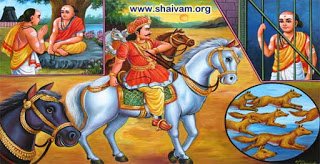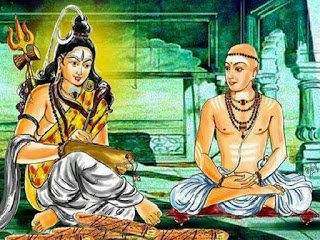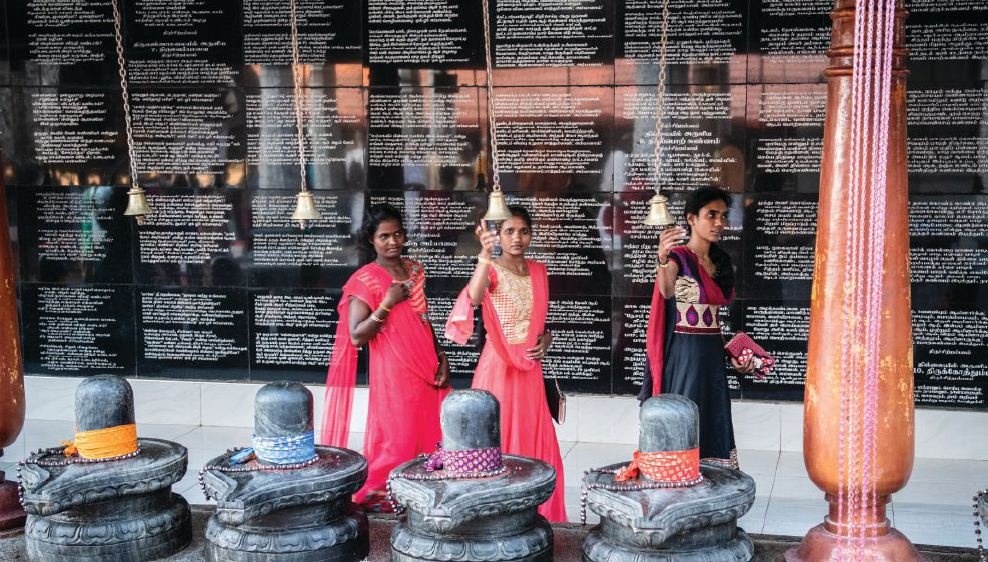|
Listen to article
Getting your Trinity Audio player ready...
|

Thiruvachakam is an extraordinary collection of Shaiva hymns written by the exemplary Shaivite saint Manikkavasagar. Thiruvachakam constitutes the eighth volume of the twelve-volume compendium of songs on Shiva in Tamizh known as Thirumurai (திருமுறை, meaning holy/sacred division), written from the 6th-11th century CE by great poets in Tamizh Nadu.
“திருவாசகத்திற்கு உருகாதோர், ஒரு வாசகத்திற்கும் உருகார்’. – “Thiruvaasagathirkku Urugaador, Oru Vasathirkum Urugaar.” – is a saying that means that if a heart cannot melt for Thiruvachakam, it cannot melt for anything!
Manikkavasagar had a huge influence on the Shaivite Bhakti movement in South India. There were many unusual magical moments in the saint’s life out of which 5 stand out.
Prodigious Child to a Politician
Born as Vadavooran to a pious Shaivite couple in Thiruvadhavoor, a small village near Madurai along the banks of river Vaigai in Tamizh Nadu, around the 9th century, the little boy Vadavooran grew up to be skilled in scriptures, learned in arts & literature, well versed in religion, and charming and compassionate in character.
Impressed by his brilliance the then reigning Pandiyan King – Arimarthana Pandiyan (862 CE–885 CE), appointed him as his Prime Minister and also gave him a special name Thennavan Brahmarayar.
Although Vadavooran held one of the most important posts in the kingdom, he was quite detached from the power, money and comforts his position offered him. He discharged his ministerial duties diligently and was an effective administrator but he seemed to always pine for something beyond his day to day life. He had a longing for a Guru who would clarify many of his doubts about rituals and religion, about Shaivism & Siddhanta, about his duties and devotion.
Vadavooran was like a peacock awaiting rain bearing clouds that would shower upon him the truth, about the Panchakshara Mantra, the Atma, so that the peacock can spread its plumes, and bloom like a flower in the ecstasy of the ultimate Truth .
Once in order to strengthen the cavalry, the Pandian King entrusted Vadavooran with the task of traveling to the coastal town to buy a variety of beautiful Arabian horses brought by traders for sale.
Vadavooran embarked on the journey carrying a great amount of money and gold from the treasury to buy the war horses. On his way he reached the temple town Tirupandurai.
Lord Shiva Himself as Sadguru
Inside the temple Vadavooran was struck by the illuminating presence of a Siddha Purusha.
Vadavooran immediately knew he had found his Guru, with hands raised in supplication and an attitude of total surrender, he received initiation Deeksha from the Guru. He burst into sweet hymns in praise of Lord Shiva. Since every word/song was precious as a gem, the Guru gave him the name – Manikkavasagar (Manikka – gem/ruby, vasagar – one whose speech/words are thus); the one whose words are precious like gems/rubies.
Manikkavasagar now started using his funds to renovate the temple of Thirupandurai on the wishes of his Guru.
Little did Manikkavasagar know that his Sadguru was Lord Shiva Himself!

Transformation of foxes into Horses and Desert into floods
Meanwhile the Pandiyan King was upset that Vadavooran was delinquent in his tasks of bringing the horses and had “misappropriated” the money from the treasury. Vadavooran was arrested. Lord Shiva came to his rescue in the guise of a majestic well informed horseman and presented him many horses. The king was stunned by the quality of the horses and released Vadavooran.
But in the night a very strange incident shook the very town of Madurai. The horses presented to the king were actually foxes! They were turning into their original forms killing the horses in the stable and escaping back into the jungle.

Suspecting Vadavooran of black magic, the King ordered him to be punished again by making him stand on the hot sand along the banks of Vaigai river carrying a boulder. The river rose into floods endangering the entire city of Madurai. The king had ordered that one member from every family must come forward to strengthen the embankment by pouring in sand.
Shiva again came down to help his devotee as a labourer. Disguising himself as a young lad, he covered up for an old lady who did not have anyone to send from her home for carrying out the King’s orders, in exchange for a “Puttu” a sweet made of rice flour and jaggery given by her.
This young lad after relishing the tasty ‘Putttu” began singing and dancing instead of working. Enraged by the callousness of the boy, the king during an inspection snapped a whip on the boy’s back. Immediately the pain was felt by the King and all the people around!
The King was shocked and realized that it was the divine play of Lord Shiva and sought forgiveness from Vadavooran. The young boy disappeared and the flood waters receded.
Delightful journey from a politician to the life of renunciation
Vadavooran gave up his ministerial position and as Manikkavasagar traveled to many temples singing the glory of Lord Shiva. He was always a Sadhaka at heart, yearning for knowledge of Atma, never caught up in the web of power or position when he had them. His shraddha in the Lord was complete & without a doubt. He was so blessed that Shiva Himself initiated him into the philosophy of Shaiva Siddhanta and imparted the ultimate knowledge of Atma to him.
Mainkkavasagar never sang for fame but sang only for Shiva, straight from his heart in touching and rapturous expressions of anguish, longing and devotion.
Uniqueness of Thiruvachakkam- Lord of Chidambaram as a scribe

Manikkavasagar’s compositions, beginning with Shiva Puranam and ending with Achcho Padikam are classified under 51 titles in more than 600 verses. Several of his works are inscribed in the walls of the Chidambaram temple. Along with Thiruvachakam, the collection of Kovai poems known as Thiruvempavai where the Lord of Thillai is looked upon as a lover and a hero; the total compositions of the Shaivite saint run into a thousand.
No other hymns on Shiva begin with the Panchakshara “Namah Shivaya ” as in Thiruvachakam! Here the glory is not of Shiva but of the five syllables which is Shiva! Shiva is kept inside the casket of Panchakshara, says Shri Adi Shankaracharya.
Manikkavasagar finally arrived and resided at Chidambaram. One day an old devout man requested him to sing all his songs so that he could document all his works. The next day the palm leaves were found in the Panchakshara steps inside the shrine of Chidambaram temple signed “as dictated by Manikkavasagar and written by Chitrambalattan (the Lord of Chidambaram”)


Even today Thiruvachakam & Tiruvempavai are sung in major Shiva Temples in Tamizh Nadu & Srilanka.
Bhagavan Ramana Maharishi once read out a stanza from Tiruvachakam which is an address to the mind, saying,
‘O humming bee [namely, mind]! Why do you take the pains of collecting tiny specks of honey from innumerable flowers? There is one from whom you can have the whole storehouse of honey by simply thinking or seeing or speaking of Him. Get within and hum to Him [hrimkara].

Do not sip the nectar,
tiny as a millet seed
found in any flower,
but speed to that mystic dancer
and hum the praise of Him, King Bee,
He who, whenever we think of Him,
whenever we behold Him,
whenever we speak of Him,
perpetually pours forth the honeyed bliss
that melts all our bones to the core.
“Manickavasagar is one of those whose body finally resolved itself in a blazing light, without leaving a corpse behind.”
For Manikkavasagar – Shiva alone was the meaning & essence of all his works.






Grace in the form of poem 🌻🙏
Beautifully written…
Thank you for unearthing and putting this nectar together!
This is a beautiful piece written with a gentleness and love. I’m glad I stumbled on it
Thank you for this. May I point out that the Thiruvempavai is part of the Thiruvasagam. He wrote the Thiruvasagam and Thirukovayar, not Thiruvasagam and Thiruvempavai, as noted in your article. Possibility an inadvertent error.